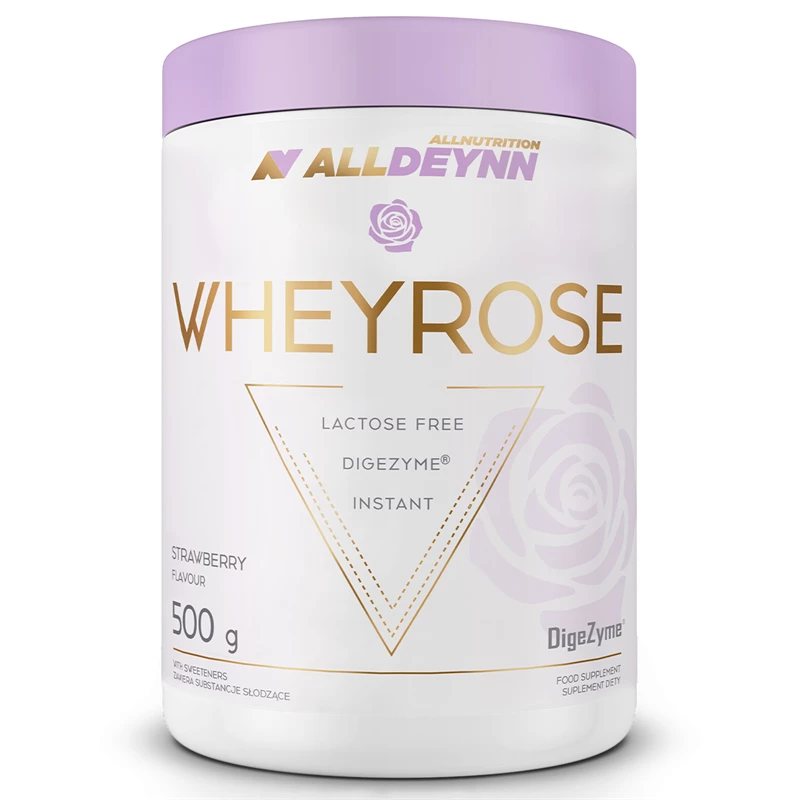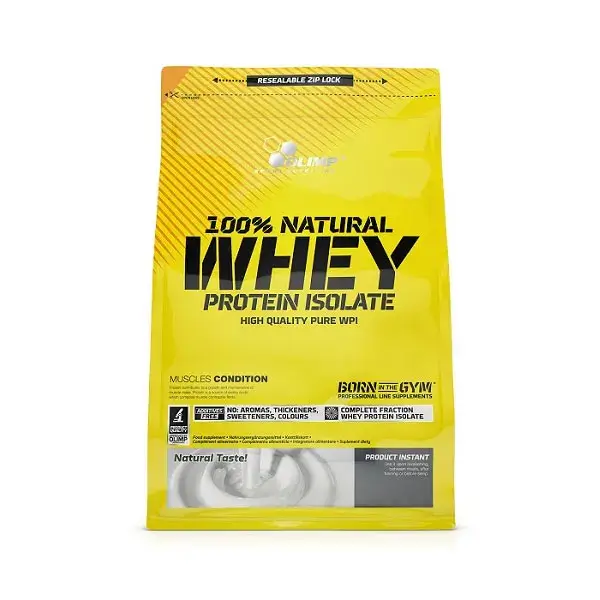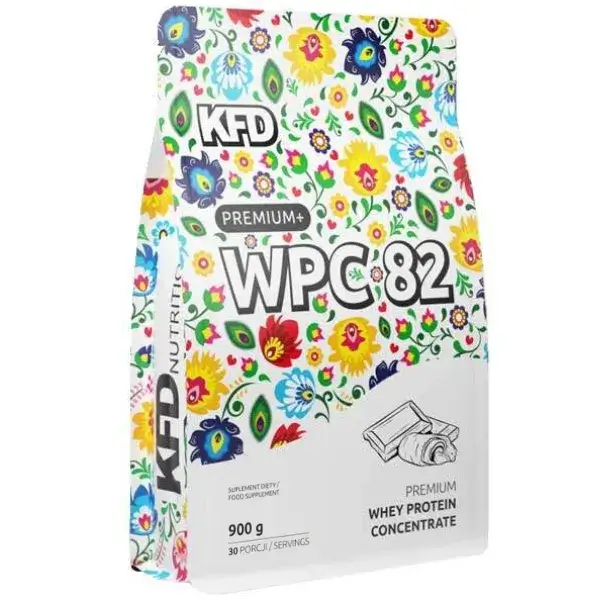When is it best to drink protein - before or after training? How do I take protein?
Find out if the timing of your protein supplement intake matters for muscle growth.


Learn more about our editorial process
.

Learn more about our editorial process
.

Learn more about our editorial process
.

Learn more about our editorial process
.
Why you can trust us
Articles on Natu.Care are written based on scientific research, data from government websites and other reliable sources. The texts are written in cooperation with doctors, nutritionists and other health and beauty experts. Articles are reviewed before publication and during significant updates.
.Learn more about our editorial process
.Information about advertisements
Content on Natu.Care may contain links to products from the sale of which we may receive a commission. When creating content, we adhere to high editorial standards and take care to be objective about the products discussed. The presence of affiliate links is not dictated by our partners, and we select the products we review ourselves completely independently.
.Learn more about our terms and Conditions
.The question: whether to drink protein before or after a workout for some rises to the rank of 'To be or not to be' (for muscle mass, of course). When you want to squeeze the maximum out of your training and diet, you work out such details - and rightly so.
Unfortunately, several myths have developed around when it is best to drink protein. Together with nutritionist and personal trainer Mark Prawdziek, we break out the anabolic window, squeeze more than 30g of protein into you at a time and explain when to drink protein so that your muscles grow and your belly doesn't ache.
The following is a guide to the best time to drink protein.
From this article you will learn:
- When is the best time to consume protein to support muscle growth and recovery. .
- How the anabolic window really works. .
- How to eat wisely before and after training.
- How to eat wisely before and after training.
See also:
.- Whey protein concentrate (WPC) .
- Whey protein isolate (WPI) .
- Whey protein hydrolysate (WPH) .
- Vegetable protein
- Casein
- Protein nutrient
When to drink protein, before or after training?
.Protein is best consumed in 3-4 servings throughout the day (approximately 20g of protein per serving), so you can provide it to your body both before and after training. For the best results in building muscle mass and promoting post-workout recovery, it is recommended to eat around 1.8-2.2g of protein per kg of body weight per day.
You don't need to cram a protein supplement or other protein source into you before your workout (and especially don't do this if you start your workout with abdominal exercises). Equally, right after your workout you don't need to run to the changing room for a shake or protein bar.
>It doesn't matter whether you take a protein supplement before or after your workout, because the most important thing is total protein supply throughout the dayand - this is the absolute foundation in the Byline Code.
Imagine this:
.You are a 90kg male, you are strength training and want to build muscle. Your protein requirement is 180g. You can drink a protein shake today before your workout with a perfectly measured portion of 20 g protein and repeat this exquisite dish moments after your workout. In total, you have provided yourself with 40 g of protein.
However, remember that in total you still need to eat 140 g of protein today for your muscles to regenerate and grow. That's why it's important to have a well-distributed protein supply for the whole day.
Let's break out the anabolic window
.Let's tackle the popular anabolic window, which is often touted as the 'golden period' for protein and carbohydrate intake post-workout. It has become established that you need to get your protein in quickly after exercise, because if you don't, the window crackles and your workout has been in vain.
In theory, the anabolic window is the time (approximately 0.5-2 hours) after intense exercise when the body is particularly receptive to the synthesis of protein, allowing for effective muscle recovery and developmentand.
.Scientific research suggests that the anabolic window is open... for up to 48 hours after training . So you don't need to drink a protein supplement immediately after a workout. The most important thing for your muscles will be how much protein you've eaten during the day and whether you've managed to break it down into 3-4 portions - as I wrote about earlier.
Benefits of protein before and after training
.You can start your workout with a post-nutrition milk mustache or finish it with a series of forearm bends with a giga protein bar. Both rituals have their benefits - tailor them to suit you.
.Protein intake by time of intakeand -
What are the benefits of protein before training?
.- Gives you energy and can improve the effectiveness of your workout (preferably in combination with carbohydrates).
- May increase the delivery of amino acids to muscle, leading to greater muscle protein synthesis.
- Prevents the onset of hunger during training. .
What does post-workout protein give you?
.- Promotes regeneration of, among other things, the muscles and nervous system after training. .
- Can accelerate the rate of muscle mass gain (as can protein consumed a few hours later).
- Prevents muscle growth.
- Prevents post-workout hunger attacks. .
Protein takes time to digest and be absorbed, peaking after 60-120 minutes, depending on the composition of the meal, after which it slowly declines. This means that protein consumed, e.g. an hour before training, will still 'work' during exercise..
 .
.
Marek Prawdzikdietitian, personal trainer and training author
Protein before and after training - eat it right
.If you want to consume protein just before or after your workout, keep a few rules in mind so that your workout goes smoothly, without stomach pain and... burping in itand.
.When?
|
When? . |
What and how much is worth eating? | When? | |
| . |
For 2-3 hours before training . |
|
|
|
For 0.5-1 hour before training . |
|
||
|
In training |
|
||
|
Immediately after training |
|
||
|
Throughout the day |
There is no need for a protein balance. |
After your workout, you don't have to drink a protein supplement straight away. You can take it easy and eat a complete meal at home containing a protein source. Provided, of course, that the interval between your pre-workout meal and your post-workout meal is no longer than 4-6 hours," explains nutritionist and trainer Marek Prawdzik.
How much protein is assimilated per serving?
.Muscle protein synthesis (MPS) reaches its maximum level when you provide the body with around 25-30 grams of protein per serving, and the body will use larger amounts for many other processes, such as energyand.
Excess protein can also be converted to urea and removed from the body..

Marek Prawdzikdietitian, personal trainer and training author
You may be familiar with the myth that the body will not absorb more than 30g of protein at a time. This misconception stems, in part, from a 1950s study that observed increased urinary nitrogen loss with higher protein intakeand. This was thought to mean that the extra protein was being 'wasted'.
It isn't. It's not that simple - after all, the body is a complex machine.
It's not that simple.
From a nutritional point of view, 'absorption' is the passage of nutrients from the gut to the systemic circulationand. Based on this definition, the amount of protein that can be assimilated is unlimited. Your body will use any amount of protein for many processes - nothing goes to waste .
There is, however, a certain 'limit' to the amount of protein in a meal, above which larger doses are unlikely to provide additional benefits - for example, eating 50g of protein after a workout does not mean your muscles will grow bigger..
 .
.
Marek Prawdzikdietitian, personal trainer and training author
In a 2013 study following the administration of 20g of casein protein, only 11% of this was used for muscle protein synthesisand.
As the study shows, it is not worth suggesting any upper limit on the amount of protein in a meal, but only ensure that there is a minimum of 25-30 grams. The body itself knows how best to distribute it.
Summary
.It doesn't matter whether you take protein before or after your workout, because the most important thing is the protein supply throughout the day. Focus on providing yourself with 25-30g of complete protein in 3-4 meals per day.
What does a protein supplement give you?
.Protein powder is a convenient solution when you want to supplement protein in your diet, which is important during both muscle mass building and weight lossand.
. .- Aids in building and maintaining muscle mass. .
- Provides essential amino acids (EAAs) that the body is unable to produce on its own.
- Provides a range of essential amino acids (EAAs) that the body cannot produce on its own.
- Increases post-training recovery. .
- Improves performance and strength during exercise. .
- Helps you to "overeat" your protein requirements when it is difficult to do so from food products. .
- It's a tasty and easy way to supplement protein when you don't consume much of it from your diet. .
See also:
Protein isn't the only thing a Beast lives for
.Protein is the building blocks from which you build muscle mass, but don't forget the fuel - carbohydrates. They give you energy and allow you to train more effectively. Carbohydrates are also important for recovery and quality sleepand.
See also:
.Summary
.- It doesn't really matter whether you eat protein before or after your workout.
- It's not a big deal.
- Both variants of protein consumption will have the same effect - your muscles will grow. .
- The most important thing is the total amount of protein consumed throughout the day. .
- If you like to take in protein before your workout, be sure not to overeat so you don't stress your digestive system before exercise. .
- Just after your workout, an easily digestible meal with balanced macronutrients (protein + fats + carbohydrates) will work. .
- People doing strength training should consume 1.8 to 2.2 g of protein per kg of body weight.
ALLDEYNN WHEYROSE
Product description
Protein supplement containing whey protein concentrate (WPC) with added digestive enzymesós. It digests well, is an easy and quick way to provide protein and can be consumed by people with lactose intolerance. It will work well not only as a stand-alone drinkóy but also as a tasty addition to shakesóy, dessertsóy, oatmeal or omeletóy.
WHEYROSE contains five digestive enzymes that help break down macromolecules into smaller components, so that the ingredients from food and the nutrient are absorbed even better. This minimises or even eliminates digestive discomfort. Such an addition is rare in protein supplements.
.Pros and cons
Protein supplement containing whey protein concentrate (WPC) with added digestive enzymesós. It digests well, is an easy and quick way to provide protein and can be consumed by people with lactose intolerance. It will work well not only as a stand-alone drinkóy but also as a tasty addition to shakesóy, dessertsóy, oatmeal or omeletóy.
WHEYROSE contains five digestive enzymes that help break down macromolecules into smaller components, so that the ingredients from food and the nutrient are absorbed even better. This minimises or even eliminates digestive discomfort. Such an addition is rare in protein supplements.
.Additional information
Protein supplement containing whey protein concentrate (WPC) with added digestive enzymesós. It digests well, is an easy and quick way to provide protein and can be consumed by people with lactose intolerance. It will work well not only as a stand-alone drinkóy but also as a tasty addition to shakesóy, dessertsóy, oatmeal or omeletóy.
WHEYROSE contains five digestive enzymes that help break down macromolecules into smaller components, so that the ingredients from food and the nutrient are absorbed even better. This minimises or even eliminates digestive discomfort. Such an addition is rare in protein supplements.
.User review
Protein supplement containing whey protein concentrate (WPC) with added digestive enzymesós. It digests well, is an easy and quick way to provide protein and can be consumed by people with lactose intolerance. It will work well not only as a stand-alone drinkóy but also as a tasty addition to shakesóy, dessertsóy, oatmeal or omeletóy.
WHEYROSE contains five digestive enzymes that help break down macromolecules into smaller components, so that the ingredients from food and the nutrient are absorbed even better. This minimises or even eliminates digestive discomfort. Such an addition is rare in protein supplements.
.ALLDEYNN VEGEROSE
Product description
A protein supplement made from five plant proteins enriched with acacia fibre, flaxseed, MCT oil and the probiotic-prebiotic complex LactoWise®. It is a synbiotic thatós stimulates the developmentóy and growth of beneficial bacteria in the gastrointestinal tract and shows a beneficial effect on the condition of the digestive system.
Pros and cons
A protein supplement made from five plant proteins enriched with acacia fibre, flaxseed, MCT oil and the probiotic-prebiotic complex LactoWise®. It is a synbiotic thatós stimulates the developmentóy and growth of beneficial bacteria in the gastrointestinal tract and shows a beneficial effect on the condition of the digestive system.
Additional information
A protein supplement made from five plant proteins enriched with acacia fibre, flaxseed, MCT oil and the probiotic-prebiotic complex LactoWise®. It is a synbiotic thatós stimulates the developmentóy and growth of beneficial bacteria in the gastrointestinal tract and shows a beneficial effect on the condition of the digestive system.
Expert opinion
A protein supplement made from five plant proteins enriched with acacia fibre, flaxseed, MCT oil and the probiotic-prebiotic complex LactoWise®. It is a synbiotic thatós stimulates the developmentóy and growth of beneficial bacteria in the gastrointestinal tract and shows a beneficial effect on the condition of the digestive system.
ALLDEYNN VEGEROSE
Product description
A protein supplement made from five plant proteins enriched with acacia fibre, flaxseed, MCT oil and the probiotic-prebiotic complex LactoWise®. It is a synbiotic thatós stimulates the developmentóy and growth of beneficial bacteria in the gastrointestinal tract and shows a beneficial effect on the condition of the digestive system.
Pros and cons
A protein supplement made from five plant proteins enriched with acacia fibre, flaxseed, MCT oil and the probiotic-prebiotic complex LactoWise®. It is a synbiotic thatós stimulates the developmentóy and growth of beneficial bacteria in the gastrointestinal tract and shows a beneficial effect on the condition of the digestive system.
Additional information
A protein supplement made from five plant proteins enriched with acacia fibre, flaxseed, MCT oil and the probiotic-prebiotic complex LactoWise®. It is a synbiotic thatós stimulates the developmentóy and growth of beneficial bacteria in the gastrointestinal tract and shows a beneficial effect on the condition of the digestive system.
Expert opinion
A protein supplement made from five plant proteins enriched with acacia fibre, flaxseed, MCT oil and the probiotic-prebiotic complex LactoWise®. It is a synbiotic thatós stimulates the developmentóy and growth of beneficial bacteria in the gastrointestinal tract and shows a beneficial effect on the condition of the digestive system.
FAQ
.When to drink protein on reduction?
.On reduction, you can drink protein at any convenient time: post-workout, pre-workout, before bed, after waking up. The specific moment is less important than the actual delivery of this macronutrient.
When to take protein on non-workout days?
.For your muscles to grow, they need the same high supply of protein every day, whether you are training or not. On non-training days, consume the recommended daily amount of protein for athletes at 1.8-2.2g of protein per kg of body weight.
How much protein should you eat to build muscle?
.Weight-training individuals looking to build muscle should consume approximately 1.8-2.2 protein per kg of body weight. This allows for adequate muscle protein synthesis and regeneration. The choice of macronutrients 'at mass' is an individual issue that is best determined with a personal trainer or nutritionist.
How much protein to eat on reduction?
.On reduction, it is advisable to set your supply of protein at 1.8g to as much as 2.5g per kilogram of body weight. A sufficiently high amount of protein on reduction prevents the loss of muscle tissue and increases satiety, which can reduce the desire for snacking and hunger attacks.
.How much protein on non-workout days?
.On non-workout days, consume 1.8-2.2g of protein per kilogram of body weight - the same as on workout days. Protein building and breakdown happens regardless of training, so it's important that you provide your body with the right amount of protein every day.
What's the best time to eat before a workout?
.About 2-3 hours before your workout, it is a good idea to eat a complete meal containing carbohydrates, fats and protein to give your body the fuel it needs. 0.5-1 hour before activity, it's best to eat a light meal containing protein and carbohydrates, and avoid fats, which can detract from your workout.
What is worth eating after a workout?
.After your workout, make sure you provide your body with a complete meal containing protein, fats and carbohydrates. When you're feeling hungry just after a workout, a protein supplement (or bar, protein drink) with a handful of nuts and rice wafers will work quickly.
.Is it possible to mix protein with creatine?
.Yes, it is possible to mix protein with creatine, as the two supplements do not interact with each other and ideally complement each other's beneficial effects on muscle. Drinking a serving of protein supplement (about 20g of protein) in combination with 5g of creatine (preferably tasteless) will work well.
Sources
.See all
.Aging, exercise, and muscle protein metabolism | Journal of Applied Physiology. (n.d.). Retrieved September 18, 2023, from https://journals.physiology.org/doi/full/10.1152/japplphysiol.91551.2008
Aragon, A. A., & Schoenfeld, B. J. (2013). Nutrient timing revisited: Is there a post-exercise anabolic window? Journal of the International Society of Sports Nutrition, 10(1), 5. https://doi.org/10.1186/1550-2783-10-5
Arent, S. M., Cintineo, H. P., McFadden, B. A., Chandler, A. J., & Arent, M. A. (2020). Nutrient Timing: A Garage Door of Opportunity? Nutrients, 12(7), 1948. https://doi.org/10.3390/nu12071948
Lonnie, M., Hooker, E., Brunstrom, J. M., Corfe, B. M., Green, M. A., Watson, A. W., Williams, E. A., Stevenson, E. J., Penson, S., & Johnstone, A. M. (2018). Protein for Life: Review of Optimal Protein Intake, Sustainable Dietary Sources and the Effect on Appetite in Ageing Adults. Nutrients, 10(3), 360. https://doi.org/10.3390/nu10030360
Nunes, E. A., Colenso-Semple, L., McKellar, S. R., Yau, T., Ali, M. U., Fitzpatrick-Lewis, D., Sherifali, D., Gaudichon, C., Tomé, D., Atherton, P. J., Robles, M. C., Naranjo-Modad, S., Braun, M., Landi, F., & Phillips, S. M. (2022). Systematic review and meta-analysis of protein intake to support muscle mass and function in healthy adults. Journal of Cachexia, Sarcopenia and Muscle, 13(2), 795-810. https://doi.org/10.1002/jcsm.12922
Park, Y., Park, H.-Y., Kim, J., Hwang, H., Jung, Y., Kreider, R., & Lim, K. (2019). Effects of whey protein supplementation prior to, and following, resistance exercise on body composition and training responses: A randomized double-blind placebo-controlled study. Journal of Exercise Nutrition & Biochemistry, 23(2), 34-44. https://doi.org/10.20463/jenb.2019.0015
Schoenfeld, B. J., & Aragon, A. A. (2018). How much protein can the body use in a single meal for muscle-building? Implications for daily protein distribution. Journal of the International Society of Sports Nutrition, 15, 10. https://doi.org/10.1186/s12970-018-0215-1
Tipton, K. D., & Phillips, S. M. (2013). Dietary protein for muscle hypertrophy. Nestle Nutrition Institute Workshop Series, 76, 73-84. https://doi.org/10.1159/000350259
Tipton, K. D., Rasmussen, B. B., Miller, S. L., Wolf, S. E., Owens-Stovall, S. K., Petrini, B. E., & Wolfe, R. R. (2001). Timing of amino acid-carbohydrate ingestion alters anabolic response of muscle to resistance exercise. American Journal of Physiology. Endocrinology and Metabolism, 281(2), E197-206. https://doi.org/10.1152/ajpendo.2001.281.2.E197
Witard, O. C., Cocke, T. L., Ferrando, A. A., Wolfe, R. R., & Tipton, K. D. (2014). Increased net muscle protein balance in response to simultaneous and separate ingestion of carbohydrate and essential amino acids following resistance exercise. Applied Physiology, Nutrition, and Metabolism = Physiologie Appliquee, Nutrition Et Metabolisme, 39(3), 329-339. https://doi.org/10.1139/apnm-2013-0264
Wu, G. (2016). Dietary protein intake and human health. Food & Function, 7(3), 1251-1265. https://doi.org/10.1039/C5FO01530H
Editorials
Meet the team

Nutritionist, personal trainer and training author
Nutritionist, personal trainer, training author, blogger and healthy lifestyle promoter, putting physical health on an equal footing with mental health. Educates on training and diet on Instagram @marek_prawiedzik

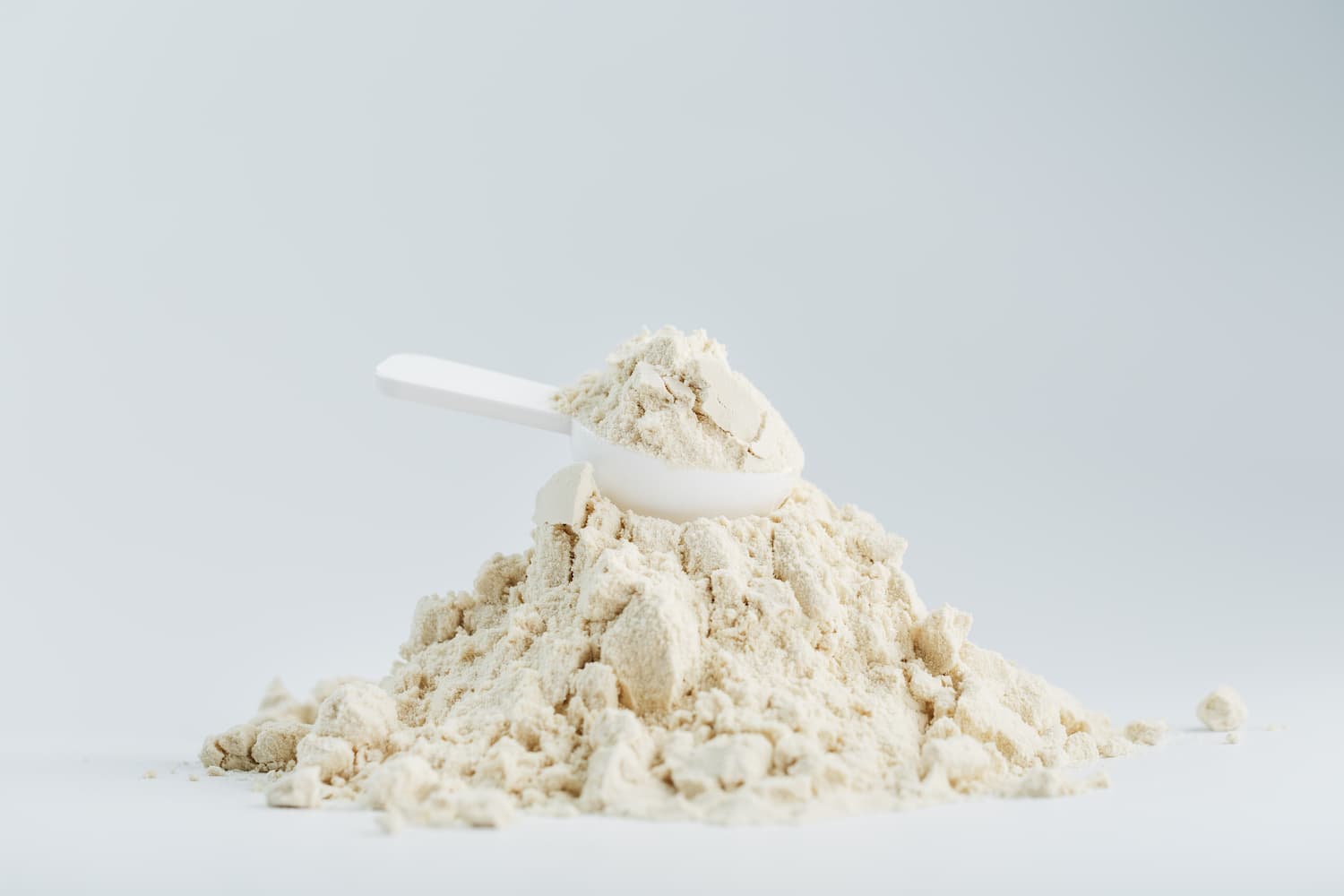
Vegan protein supplements add protein to the diets of athletes and non-athletes alike.

Look after the protein in your diet whether you are on a weight gain, weight reduction or weight maintenance.
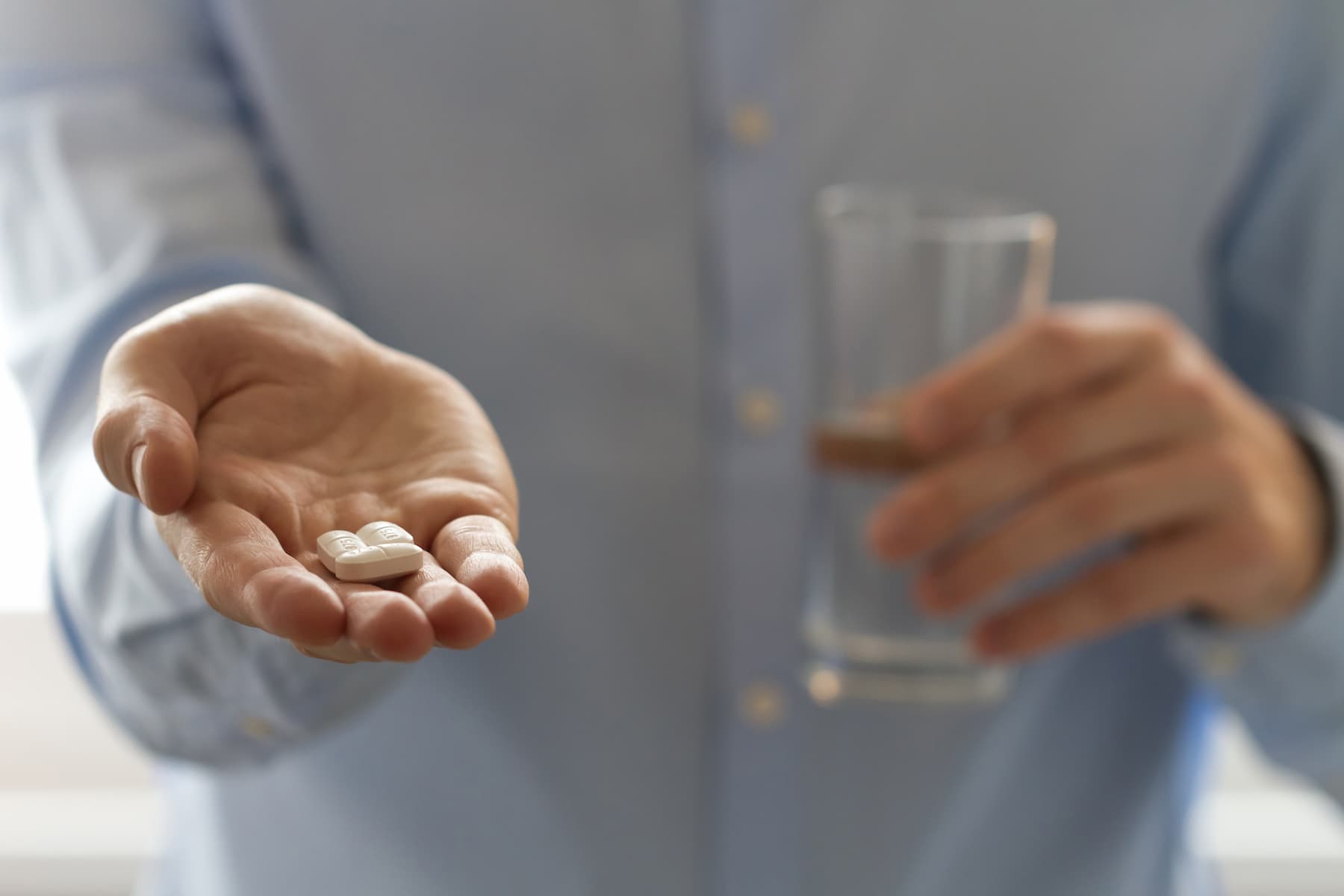
Methionine is a little-known amino acid that is responsible for many functions in the body.
